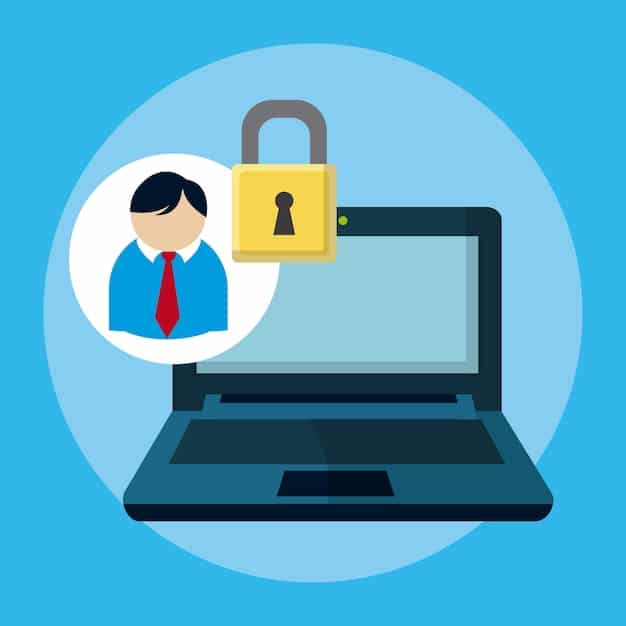Data Privacy Regulations: A Business Guide to Compliance

Data privacy regulations are laws that govern how businesses collect, use, and store personal data. Understanding and adhering to these regulations is crucial for businesses to avoid fines, maintain customer trust, and ensure ethical data handling practices.
Navigating the complex landscape of data privacy regulations can be challenging for businesses of all sizes. Staying compliant with the latest requirements is not just a legal obligation but also a critical aspect of building trust with customers and maintaining a positive brand reputation.
Understanding the Core Principles of Data Privacy Regulations
Data privacy regulations are built upon several core principles that guide how businesses should handle personal data. These principles are designed to protect individuals’ rights and ensure responsible data management.
Transparency and Notice
Transparency is paramount. Businesses must clearly inform individuals about what data is collected, how it’s used, and with whom it’s shared. This is typically achieved through privacy policies and notices.
Purpose Limitation
Data should only be collected and used for specified, legitimate purposes. Businesses cannot collect data “just in case” or use it for purposes that were not disclosed to the individual.

Data Minimization
Businesses should only collect the minimum amount of data necessary to achieve the stated purpose. Avoid collecting excessive or irrelevant information.
- Collect Only What’s Necessary: Focus on the data genuinely required for your business operations.
- Regularly Review Data Collection Practices: Ensure that you are not collecting data that is no longer needed.
- Implement Data Retention Policies: Establish clear guidelines for how long data is stored and when it should be deleted.
In essence, understanding these core principles is the foundation for building a robust data privacy strategy.
Key Data Privacy Regulations in the US
The data privacy landscape in the US is a patchwork of federal and state laws, with no single, comprehensive federal law governing data privacy. Businesses operating in the US must navigate this complex legal environment.
California Consumer Privacy Act (CCPA)
The CCPA gives California residents significant rights over their personal data, including the right to know what data is collected, the right to delete their data, and the right to opt-out of the sale of their data.
California Privacy Rights Act (CPRA)
The CPRA amends and expands the CCPA, introducing new rights such as the right to correct inaccurate personal information and the right to limit the use of sensitive personal information.
Other State Laws
Several other states, including Virginia, Colorado, Utah, and Connecticut, have enacted their own comprehensive data privacy laws. These laws vary in their specific requirements, but generally align with the principles of the CCPA and CPRA.
- Virginia Consumer Data Protection Act (CDPA): Grants consumers rights to access, correct, delete, and obtain a copy of their personal data.
- Colorado Privacy Act (CPA): Similar to the CDPA, but also includes provisions related to profiling and automated decision-making.
- Utah Consumer Privacy Act (UCPA): A more business-friendly law with fewer compliance obligations than the CCPA or CPRA.
Navigating these state-level regulations requires a comprehensive understanding of each law’s specific requirements and careful planning to ensure compliance across different jurisdictions.
The EU’s General Data Protection Regulation (GDPR) and US Businesses
Even if your business is based in the US, the EU’s General Data Protection Regulation (GDPR) may apply. The GDPR governs the processing of personal data of individuals within the European Economic Area (EEA).
When Does GDPR Apply to US Businesses?
GDPR applies if your business:
* Offers goods or services to individuals in the EEA, regardless of whether payment is required.
* Monitors the behavior of individuals in the EEA.
Key Requirements of GDPR
GDPR imposes stringent requirements on businesses, including:
* Obtaining explicit consent for data processing.
* Providing clear and transparent information about data processing activities.
- Data Protection Officer (DPO): Appointing a DPO if your business engages in large-scale data processing.
- Data Breach Notification: Implementing procedures for notifying regulators and individuals in the event of a data breach.
- Cross-Border Data Transfers: Ensuring compliance with restrictions on transferring data outside the EEA.
Complying with GDPR requires a significant investment in data privacy infrastructure and processes, but it is essential for businesses that operate in the EU market.

Steps to Ensure Compliance with Data Privacy Regulations
Achieving and maintaining compliance with data privacy regulations requires a proactive and systematic approach. Here are some key steps businesses can take.
Conduct a Data Audit
Start by conducting a comprehensive audit of your data collection and processing practices. Identify what data you collect, where it’s stored, how it’s used, and with whom it’s shared.
Update Your Privacy Policy
Your privacy policy should be clear, comprehensive, and easily accessible to individuals. It should accurately reflect your data processing practices and comply with all applicable regulations.
Implement Data Security Measures
Protect personal data from unauthorized access, use, or disclosure by implementing appropriate technical and organizational security measures. This includes encryption, access controls, and regular security assessments.
- Employee Training: Providing regular training to employees on data privacy practices and security protocols.
- Incident Response Plan: Create and implement a plan for addressing data breaches and security incidents.
- Vendor Management: Ensuring that third-party vendors also comply with data privacy requirements.
These steps are essential for creating a data privacy program that is both effective and compliant.
The Role of Technology in Data Privacy Compliance
Technology plays a crucial role in helping businesses comply with data privacy regulations. A number of tools and solutions are available to automate and streamline data privacy processes.
Privacy Management Platforms
These platforms offer a range of features, including data mapping, consent management, and data subject request (DSR) automation.
Data Loss Prevention (DLP) Solutions
DLP solutions help prevent sensitive data from leaving the organization’s control, either intentionally or unintentionally.
Encryption Tools
Encryption tools protect data both in transit and at rest, making it unreadable to unauthorized parties.
- Consent Management Platforms (CMPs): These platforms help businesses obtain and manage user consent for data processing activities.
- Data Discovery Tools: These tools automatically scan systems and identify personal data, helping businesses understand where sensitive information is stored.
- Anonymization and Pseudonymization Techniques: These techniques help to protect privacy by removing or replacing identifying information with non-identifying data.
By leveraging these technologies, businesses can significantly improve their data privacy compliance posture.
The Future of Data Privacy Regulations
Data privacy regulations are constantly evolving in response to new technologies and changing societal expectations. Businesses need to stay informed about emerging trends and adapt their data privacy practices accordingly.
Increased Enforcement
Regulators are becoming more active in enforcing data privacy laws, imposing significant fines on businesses that violate these regulations.
New Technologies and Privacy
Emerging technologies such as artificial intelligence (AI) and the Internet of Things (IoT) raise new data privacy challenges. Businesses need to consider the privacy implications of these technologies and implement appropriate safeguards.
Global Harmonization
There is a growing trend towards global harmonization of data privacy laws, with more countries adopting comprehensive data privacy frameworks.
- Focus on Ethical AI: Developing and deploying AI systems in a responsible and ethical manner.
- Emphasis on Data Security: Enhancing data security measures to protect against cyber threats and data breaches.
- Consumer Empowerment: Giving consumers more control over their personal data through enhanced rights and transparency.
Staying ahead of these trends is crucial for businesses that want to remain compliant and maintain a competitive advantage.
| Key Point | Brief Description |
|---|---|
| 🔑 Core Principles | Transparency, purpose limitation, and data minimization are fundamental. |
| 🏛️ Key Regulations | CCPA, CPRA, GDPR, and other state laws may apply to your business. |
| 🛡️ Compliance Steps | Conduct data audits, update privacy policies, and implement security measures. |
| 🤖 Tech’s Role | Privacy management platforms, DLP, and encryption are vital tools. |
FAQ
▼
Data privacy regulations are laws that govern how organizations collect, use, store, and share personal information. They aim to protect individuals’ privacy rights and ensure responsible data handling practices. Compliance is mandatory and can impact all aspects of a business.
▼
Compliance with data privacy regulations is essential for maintaining customer trust, avoiding hefty fines, and protecting brand reputation. These regulations also encourage better data security practices, reducing the risk of breaches and data misuse that can erode consumer confidence.
▼
The CCPA (California Consumer Privacy Act) grants California residents specific rights over their personal data, including the rights to know, delete, and opt-out of the sale of their information. If your business collects personal data from California residents, you must comply with the CCPA.
▼
Yes, the GDPR (General Data Protection Regulation) can apply to US businesses if they offer goods or services to individuals in the European Economic Area (EEA) or monitor their behavior. Compliance with GDPR is required regardless of where your business is located.
▼
To ensure compliance, conduct regular data audits, update your privacy policy, implement robust security measures, provide employee training, and stay informed about changes in data privacy laws. Utilizing privacy management platforms can also streamline these processes.
Conclusion
Navigating data privacy regulations is a complex but crucial undertaking for businesses today. By understanding the core principles, staying informed about the latest legal requirements, and implementing appropriate technical and organizational safeguards, businesses can protect privacy, build trust, and maintain a competitive advantage in an increasingly data-driven world.





